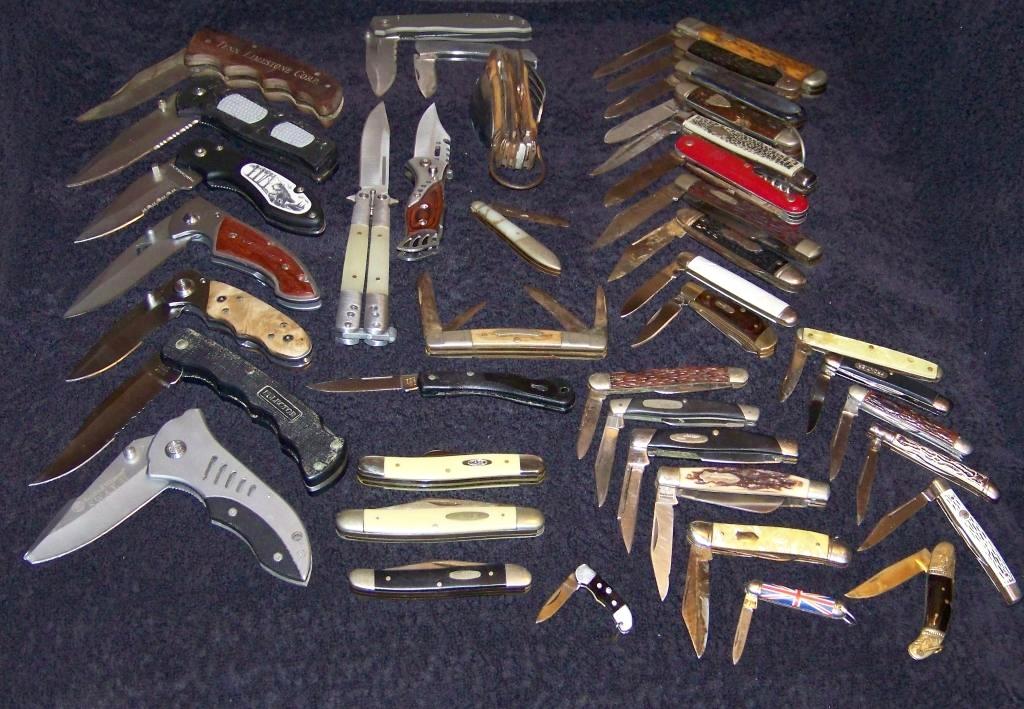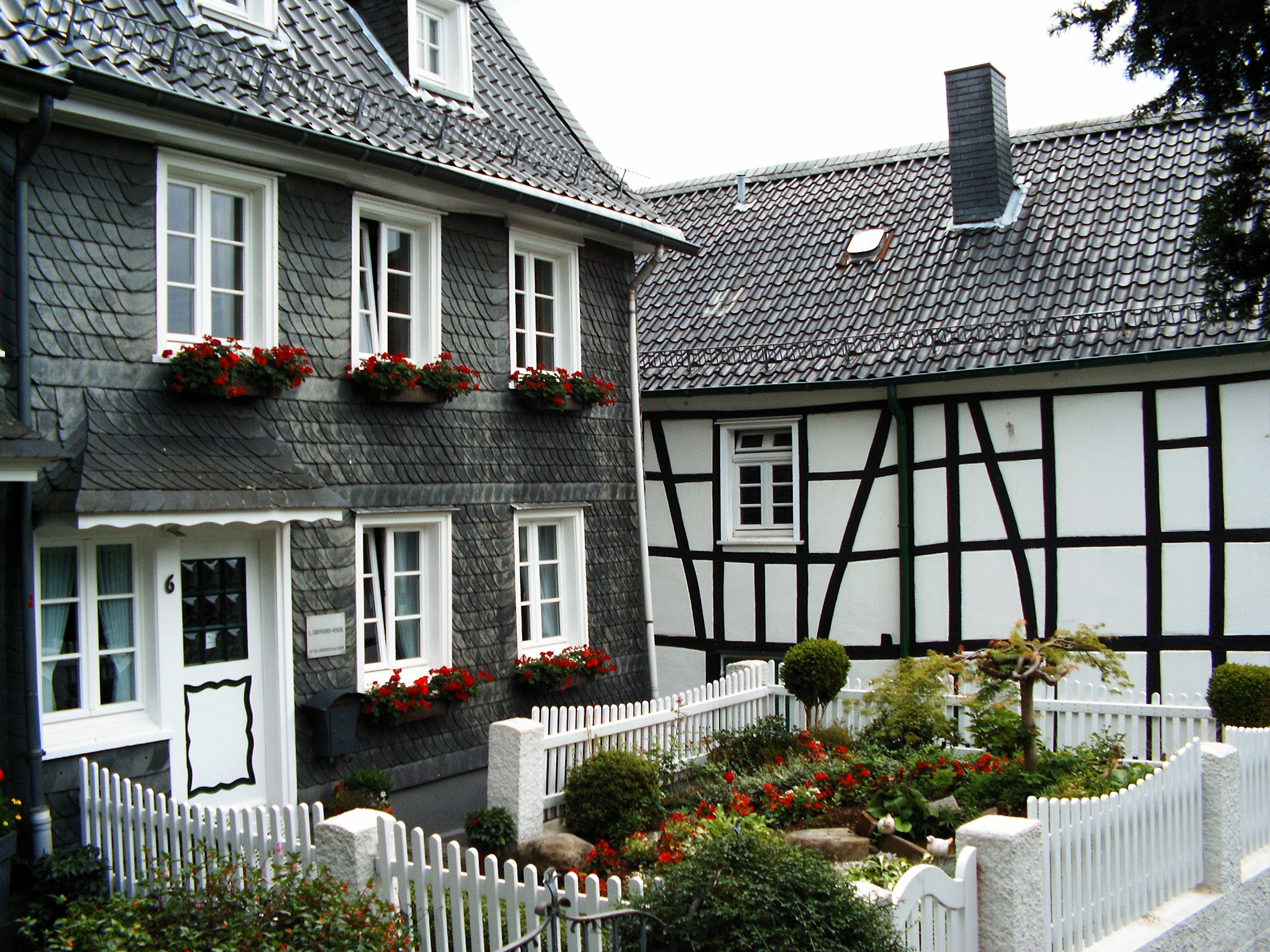|
Mercator K55K
The Mercator K55K is a type of pocketknife produced in Germany since around 1867. Mercator knives were primarily produced by Hy. Kauffmann, which was operational from 1856 to 1995. The Mercator K55K knife is still produced in Germany by Mercator, now a division of Otter-Messer. Construction The Mercator K55K is of very simple construction: The handle consists of a folded piece of sheet metal, usually painted black, engraved with the outline of a leaping cat and the legend "K55K", with the second "K" being backwards. The blade has a nail-nick by which it may be grasped to pull it open, and it locks in the open position (a lockback knife), after which it may only be closed by depressing a lever at the back of the knife. As of 2013, the knife can be purchased with a stainless steel or carbon steel blade. The Mercator's construction is similar to that of the later appeared French Douk-Douk knife, in terms of the simple folded-metal handle. However, the Douk-Douk is a slipjoint kn ... [...More Info...] [...Related Items...] OR: [Wikipedia] [Google] [Baidu] |
Mercator K55K Folding Knife
__NOTOC__ Mercator (Latin for "merchant") may refer to: People * Marius Mercator (c. 390–451), a Catholic ecclesiastical writer * Arnold Mercator, a 16th-century cartographer * Gerardus Mercator, a 16th-century cartographer ** Mercator 1569 world map ** Mercator projection, a cartographic projection devised by Gerardus Mercator * Rumold Mercator, a 16th-century cartographer * Nicholas Mercator, a 17th-century mathematician ** Mercator series, a representation of the natural logarithm Companies and universities * Mercator (retail), a Slovenian supermarket chain * Mercator_Serbia , Mercator-S, a retail company in Serbia, part of Agrokor Group * Mercator School of Management, University of Duisburg-Essen, Germany * Mercator Limited, a shipping company in India * Mercator Corporation, a consulting firm and investment bank formed by James Giffen, involved with Kazakhgate Vehicles * Mercator (ship), ''Mercator'' (ship), a barquentine museum ship in Oostende, Belgium * P4M Mercat ... [...More Info...] [...Related Items...] OR: [Wikipedia] [Google] [Baidu] |
Pocketknife
A pocketknife is a knife with one or more blades that fold into the handle. They are also known as jackknives (jack-knife), folding knives, or may be referred to as a penknife, though a penknife may also be a specific kind of pocketknife. A typical blade length is . Pocketknives are versatile tools, and may be used for anything from whittling and woodcarving, to butchering small game, gutting and filleting small fish, aiding in the preparation of tinder and kindling for fires, boring holes in soft material, to opening an envelope, cutting twine, slicing a piece of fruit or as a means of self-defense. Specialised designs are also used for mushroom hunting and gardening. Pocketknives designed for gardening include pruning knives, which are folding knives with long curved blades used for pruning, trimming cuttings, taking buds and preparing material for grafting. History The earliest known pocketknives date to at least the early Iron Age. A pocketknife with a bone handl ... [...More Info...] [...Related Items...] OR: [Wikipedia] [Google] [Baidu] |
Sheet Metal
Sheet metal is metal formed into thin, flat pieces, usually by an industrial process. Sheet metal is one of the fundamental forms used in metalworking, and it can be cut and bent into a variety of shapes. Thicknesses can vary significantly; extremely thin sheets are considered foil or leaf, and pieces thicker than 6 mm (0.25 in) are considered plate, such as plate steel, a class of structural steel. Sheet metal is available in flat pieces or coiled strips. The coils are formed by running a continuous sheet of metal through a roll slitter. In most of the world, sheet metal thickness is consistently specified in millimeters. In the U.S., the thickness of sheet metal is commonly specified by a traditional, non-linear measure known as its gauge. The larger the gauge number, the thinner the metal. Commonly used steel sheet metal ranges from 30 gauge to about 7 gauge. Gauge differs between ferrous ( iron-based) metals and nonferrous metals such as aluminum or copper. Cop ... [...More Info...] [...Related Items...] OR: [Wikipedia] [Google] [Baidu] |
Pocket Knife
A pocketknife is a knife with one or more blades that fold into the handle. They are also known as jackknives (jack-knife), folding knives, or may be referred to as a penknife, though a penknife may also be a specific kind of pocketknife. A typical blade length is . Pocketknives are versatile tools, and may be used for anything from whittling and woodcarving, to butchering small game, gutting and filleting small fish, aiding in the preparation of tinder and kindling for fires, boring holes in soft material, to opening an envelope, cutting twine, slicing a piece of fruit or as a means of self-defense. Specialised designs are also used for mushroom hunting and gardening. Pocketknives designed for gardening include pruning knives, which are folding knives with long curved blades used for pruning, trimming cuttings, taking buds and preparing material for grafting. History The earliest known pocketknives date to at least the early Iron Age. A pocketknife with a bone handle wa ... [...More Info...] [...Related Items...] OR: [Wikipedia] [Google] [Baidu] |
Douk-Douk
The douk-douk is a French-made pocket knife of simple sheet-metal construction. It has been manufactured by the M. C. Cognet cutlery firm in Thiers, France, since 1929. Design origins The external engraving of the ''douk-douk'' was created in 1929 by Gaspard Cognet of Cognet, Antoine & Gaspard for sales to France's colonies in Oceania. The handle depicts a " douk-douk", or Melanesian spirit incarnation. Cognet based the design on an engraving in an illustrated dictionary. Later other designs such as the "El Baraka" and "Tiki" were developed for other regional markets, particularly in French Algeria, and even south into Sub-Saharan Africa. Originally intended as an inexpensive utility pocket knife for the ordinary working man, the popularity of the ''douk-douk'' caused it to be pressed into service as a weapon when necessary.Sarrat, Jean, ''Il était une fois mon Algérie à moi: Biographie'', Editeur Indépendant, , (2007), p. 238 During the 1954-1962 FLN-led revolt in Alg ... [...More Info...] [...Related Items...] OR: [Wikipedia] [Google] [Baidu] |
Slipjoint
A slipjoint knife is one of the most ubiquitous types of pocketknives. A slipjoint knife consists of a handle with one or more folding blades. These blades are held in position by a strong "backspring" which biases them towards the open and closed position (that is the spring tries to hold the blade closed until it has been pulled past a 90 degree arc from the handle, when the spring force reverses and the blade is inclined to spring to the open position - or at least resists closing once open. Some knife blades feature a "neutral" position where when opened to 90 degrees from the handle the blade enters a third detent and neither tries to open or close.) Contrast this with the penny knife, which has no locking mechanism other than friction, or locking knives which mechanically lock the blade in position. Variants The United States produced a massive array of slipjoint knife models from the mid-19th century to the present day. The following is a list of representative models and t ... [...More Info...] [...Related Items...] OR: [Wikipedia] [Google] [Baidu] |
Solingen
Solingen (; li, Solich) is a city in North Rhine-Westphalia, Germany. It is located some 25 km east of Düsseldorf along the northern edge of the region called Bergisches Land, south of the Ruhr area, and, with a 2009 population of 161,366, is after Wuppertal the second-largest city in the Bergisches Land. It is a member of the regional authority of the Rhineland. Solingen is called the "City of Blades", since it has long been renowned for the manufacturing of fine swords, knives, scissors and razors made by famous firms such as WKC Stahl- und Metallwarenfabrik, WKC, DOVO Solingen, DOVO, Wüsthof, J. A. Henckels, Zwilling J. A. Henckels, Böker, Güde, Hubertus, Diefenthal, Puma, Clauberg, Eickhorn, Linder, Carl Schmidt Sohn, Dreiturm, Herder, and numerous other manufacturers. In medieval times, the swordsmiths of Solingen designed the town's coat of arms, which continues to the present. In the latter part of the 17th century, a group of swordsmiths from Solingen broke thei ... [...More Info...] [...Related Items...] OR: [Wikipedia] [Google] [Baidu] |
World War II
World War II or the Second World War, often abbreviated as WWII or WW2, was a world war that lasted from 1939 to 1945. It involved the vast majority of the world's countries—including all of the great powers—forming two opposing military alliances: the Allies and the Axis powers. World War II was a total war that directly involved more than 100 million personnel from more than 30 countries. The major participants in the war threw their entire economic, industrial, and scientific capabilities behind the war effort, blurring the distinction between civilian and military resources. Aircraft played a major role in the conflict, enabling the strategic bombing of population centres and deploying the only two nuclear weapons ever used in war. World War II was by far the deadliest conflict in human history; it resulted in 70 to 85 million fatalities, mostly among civilians. Tens of millions died due to genocides (including the Holocaust), starvation, ma ... [...More Info...] [...Related Items...] OR: [Wikipedia] [Google] [Baidu] |
Products Introduced In 1867
Product may refer to: Business * Product (business), an item that serves as a solution to a specific consumer problem. * Product (project management), a deliverable or set of deliverables that contribute to a business solution Mathematics * Product (mathematics) Algebra * Direct product Set theory * Cartesian product of sets Group theory * Direct product of groups * Semidirect product * Product of group subsets * Wreath product * Free product * Zappa–Szép product (or knit product), a generalization of the direct and semidirect products Ring theory * Product of rings * Ideal operations, for product of ideals Linear algebra * Scalar multiplication * Matrix multiplication * Inner product, on an inner product space * Exterior product or wedge product * Multiplication of vectors: ** Dot product ** Cross product ** Seven-dimensional cross product ** Triple product, in vector calculus * Tensor product Topology * Product topology Algebraic topology * Cap product * Cup product * ... [...More Info...] [...Related Items...] OR: [Wikipedia] [Google] [Baidu] |
Goods Manufactured In Germany
In economics, goods are items that satisfy human wants and provide utility, for example, to a consumer making a purchase of a satisfying product. A common distinction is made between goods which are transferable, and services, which are not transferable. A good is an "economic good" if it is useful to people but scarce in relation to its demand so that human effort is required to obtain it.Samuelson, P. Anthony., Samuelson, W. (1980). Economics. 11th ed. / New York: McGraw-Hill. In contrast, free goods, such as air, are naturally in abundant supply and need no conscious effort to obtain them. Private goods are things owned by people, such as televisions, living room furniture, wallets, cellular telephones, almost anything owned or used on a daily basis that is not food-related. A consumer good or "final good" is any item that is ultimately consumed, rather than used in the production of another good. For example, a microwave oven or a bicycle that is sold to a consumer is a ... [...More Info...] [...Related Items...] OR: [Wikipedia] [Google] [Baidu] |



.jpg)



